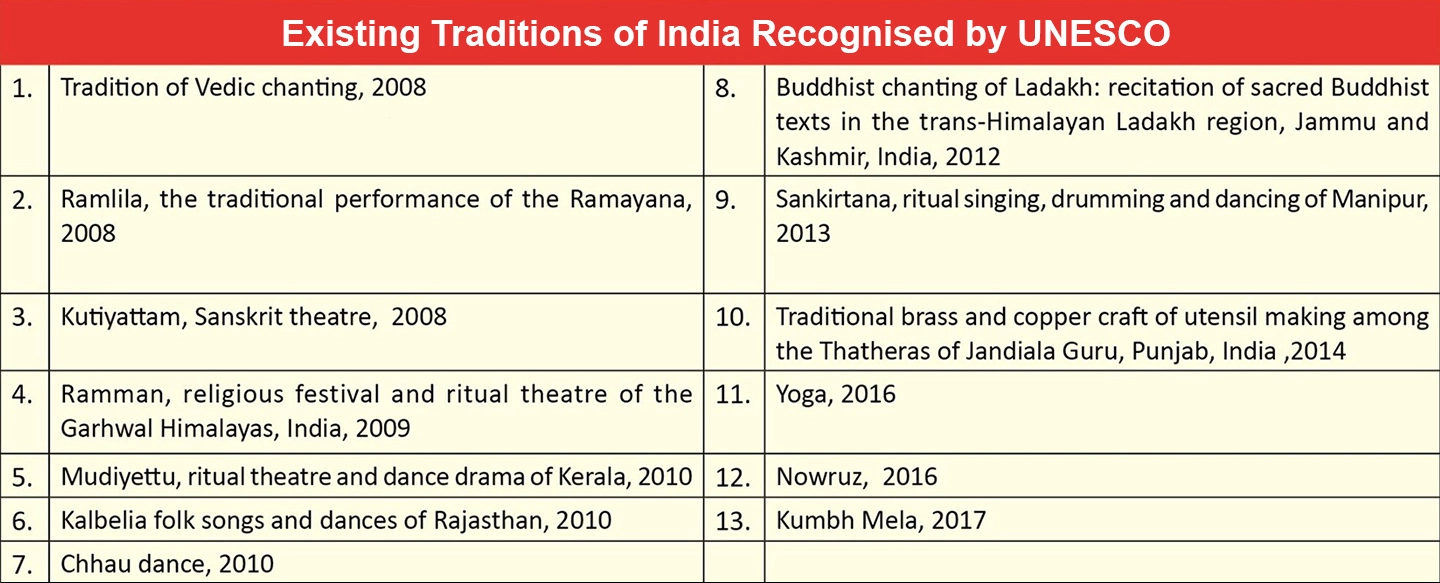International Relations
UNESCO’s Convention on Intangible Cultural Heritage
- 08 Jul 2022
- 4 min read
For Prelims: Intangible Culture Heritage, UNESCO, SDGs.
For Mains: UNESCO’s Convention for Safeguarding Intangible Heritage and its Significance.
Why in News?
India has been elected to the Intergovernmental Committee of UNESCO’s 2003 Convention for the Safeguarding of the Intangible Cultural Heritage (ICH) for the 2022-2026 cycle.
- India has served as a member of the ICH Committee twice — from 2006 to 2010 and from 2014 to 2018.
- Earlier, Durga Puja in Kolkata was inscribed on the UNESCO’s Representative List of the Intangible Cultural Heritage (ICH) of Humanity.
What is Intangible Cultural Heritage?
- Intangible cultural heritage is the practices, expressions, knowledge and skills that communities, groups and sometimes individuals recognise as part of their cultural heritage.
- Also called living cultural heritage, it is usually expressed in one of the following forms:
- Oral Traditions
- Performing Arts
- Social Practices
- Rituals and Festive events
- Knowledge and Practices concerning nature and the universe
- Traditional Craftsmanship
What is the Significance of India’s Election to the Convention?
- It will help India focus on fostering community participation, strengthening international cooperation through intangible heritage, promoting academic research on intangible cultural heritage and aligning the work of the Convention with the UN Sustainable Development Goals.
- India will have the opportunity to closely monitor the implementation of the 2003 Convention.
- India shall endeavour to encourage international dialogue within the State Parties to the Convention to better showcase the diversity and importance of living heritage.
What is UNESCO’s Convention for Safeguarding the Intangible Heritage?
- About:
- The Convention of the Safeguarding of the Intangible Cultural Heritage was adopted by the United Nations Educational, Scientific and Cultural Organization (UNESCO) in 2003 and entered into force in 2006.
- It comprises 24 members and is elected in the General Assembly of the Convention according to the principles of equitable geographical representation and rotation.
- Members of the Committee are elected for a term of four years.
- Purpose:
- To safeguard the expressions of intangible cultural heritage that are endangered by the processes of globalization.
- To ensure respect for the intangible cultural heritage of the communities, groups and individuals.
- To raise awareness at the local, national and international levels of the importance of intangible cultural heritage.
- Publications:
- Representative List of the Intangible Cultural Heritage of Humanity.
- List of Intangible Cultural Heritage in Need of Urgent Safeguarding.
- Register of good safeguarding practices.
Which Indian Elements were Recognized as ICH?
- India has 14 intangible cultural heritage elements on the prestigious UNESCO Representative List of ICH of Humanity.
- Other than the Durga Puja there are 13 Traditions in India recognised by UNESCO as ICH.





